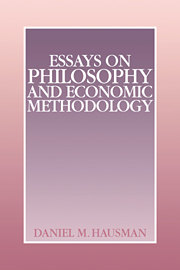Introduction: What is philosophy of economics?
Published online by Cambridge University Press: 05 June 2012
Summary
I wound up doing philosophy of economics almost by chance. As a graduate student in philosophy at Columbia University, I was searching for a dissertation topic when John Eatwell came to town and delivered an exciting series of lectures on the so-called Cambridge Controversy in capital theory. The history he described was so unlike anything suggested by the philosophy of science I had studied that it seemed that there might be something of interest to be said about it. The slogan in philosophy of science at the time was, after all, that one should study what scientists actually do. And applying that slogan to economics seemed particularly interesting, since it was by no means uncontroversial that economics was a science. Furthermore, I had a tremendous resource ready to hand in Sidney Morgenbesser, who knows more about these issues than any other living philosopher. So over the Christmas holidays in 1976 I decided to do a dissertation on philosophy of economics.
It was a lucky choice. I had more than one great teacher in the subject, for Isaac Levi gradually convinced me of the centrality of problems concerning rational choice, and Ronald Findlay generously coached me into a modest competence in capital theory. My timing was perfect, too, for the great wave of contemporary interest in philosophy of economics was just beginning.
- Type
- Chapter
- Information
- Essays on Philosophy and Economic Methodology , pp. 1 - 10Publisher: Cambridge University PressPrint publication year: 1992



